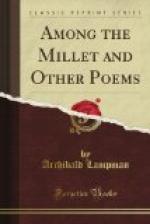XIV
“There is the gift I bring”; the stranger’s
head
Turns to the cup that glitters at his
side;
“And now my tongue draws back for very dread,
Unhappy youth, from what it must not hide.
The saddest tale that ever lips have said;
Yet thou must know how sweet Lenora died,
A broken martyr for love’s weary sake,
And left this gift for thee to leave or take.”
XV
Poor Nino listens with that marble face,
And eyes that move not, strangely wide
and set.
The monk continues with his mournful grace:
“She told me, Nino, how you often
met
In secret, and your plighted loves kept pace,
Together, tangled in the self-same net;
Your dream’s dark danger and its dread you knew,
And still you met, and still your passion grew.
XVI
“And aye with that luxurious fire you fed
Your dangerous longing daily, crumb by
crumb;
Nor ever cared that still above your head
The shadow grew; for that your lips were
dumb.
You knew full keenly you could never wed:
’Twas all a dream: the end
must surely come;
For not on thee her father’s eyes were turned
To find a son, when mighty lords were spurned.
XVII
“Thou knowest that new-sprung prince, that proud
up-start,
Pisa’s new tyrant with his armed
thralls,
Who bends of late to take the people’s part,
Yet plays the king among his marble halls,
Whose gloomy palace in our city’s heart,
Frowns like a fortress with its loop-holed
walls.
’Twas him he sought for fair Leonora’s
hand,
That so his own declining house might stand.
XVIII
“The end came soon; ’twas never known
to thee;
But, when your love was scarce a six months
old,
She sat one day beside her father’s knee,
And in her ears the dreadful thing was
told.
Within one month her bridal hour should be
With Messer Gianni for his power and gold;
And as she sat with whitened lips the while,
The old man kissed her, with his crafty smile.
XIX
“Poor pallid lady, all the woe she felt
Thou, wretched Nino, thou alone canst
know,
Down at his feet with many a moan she knelt,
And prayed that he would never wound her
so.
Ah, tender saints! it was a sight to melt
The flintiest heart; but his could never
glow.
He sat with clenched hands and straightened head,
And frowned, and glared, and turned from white to
red.
XX
“And still with cries about his knees she clung,
Her tender bosom broken with her care.
His words were brief, with bitter fury flung:
’The father’s will the child
must meekly bear;
I am thy father, thou a girl and young.’
Then to her feet she rose in her despair,
And cried with tightened lips and eyes aglow,
One daring word, a straight and simple, ‘No!’




